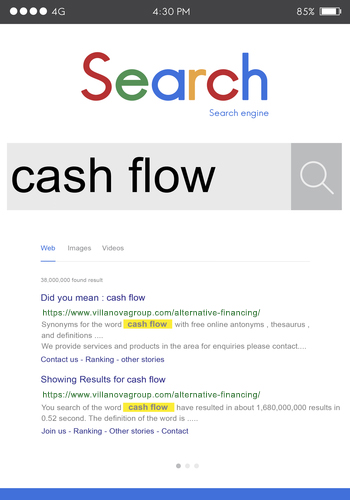Business cash flow is vital to a business’ health. Unfortunately, many businesses struggle with cash flow issues even when they are doing well. They may not have the funds to cover payroll and operational expenses due to long receivables or extremely rapid growth. They may not qualify for traditional bank financing due to various factors, including not being in business long enough, showing slow or even negative cash flow, personal credit issues, or being overleveraged in debt. Other businesses prefer to explore alternative financing first in order to avoid taking on additional debt or to get much-needed cash more quickly and with less paperwork.
If you’re a business struggling with cash flow, you may be considering alternative forms of financing. Two financial tools that work well for businesses with cash flow issues are business factoring and merchant cash advances. In this two-part series, we’ll look at each in detail. Today’s post will help you decide if business factoring is right for you.
Alternative Financing
Factoring is one of the oldest forms of alternative financing for business; yet, misconceptions about this useful alternative financing tool still abound. Factoring is a way for businesses to ensure they have sufficient working capital or to acquire assets to accommodate rapid growth. Companies with long receivables or a lot of inventory may have funds tied up in these assets, making them unable for operational expenses, such as payroll, rent, and utilities. Other times, companies need to purchase additional assets, such as equipment or additional inventory, to keep up with customer demand. In these situations, businesses are doing well, but aren’t able to keep up with day-to-day costs due to inconsistent cash flow.
Factoring has long been seen as a “last resort,” to be used when you can’t get traditional bank financing. However, factoring is actually a useful tool for many types of businesses with receivables. It’s used by small outfits and huge corporations alike, not as a last-ditch lifeline, but as a convenient way to keep the business humming along or accommodate a company’s growth.
How Does Factoring Work?
A typical factoring arrangement works like this: ABC Lumber has 100 customers, many of which owe ABC money and simply haven’t paid their invoices yet. But ABC needs money now for operating costs. So, ABC sells its receivables to a financing company (the factor). The factor buys ABC’s outstanding invoices at face value, which together are worth $100,000. The factor pays ABC $80,000 right away. Then the factor takes over the collection and accounting of those invoices. When they receive the money, they take a cut (usually from 1% to 6% of the invoice’s value) and send the rest on to ABC. If the factoring fee is 6%, you ultimately end up with $94,000.
This is a simple example, and it’s important to realize that there are various ways of structuring factoring rates and fees. While some factors offer a straightforward fee arrangement like the above, other factors might charge collection or other fees in addition to taking their percentage cuts. Interest may be applied and compounded to older invoices. The factor may increase your rates at the end of the year if there are too many outstanding invoices. You’ll want to scrutinize that factoring contract to weed out hidden fees and take the time to understand what you’ll really be shelling out over the life of the contract. Factoring generally has higher interest rates than other types financing options, such as bank loans. However, if you don’t qualify or don’t want to pursue a bank loan, factoring can offer several advantages.
Companies of all sizes, from one-person businesses to Fortune 500 corporations, use factoring as a way to increase their cash flow. Factoring spans all industries, including trucking, transportation, manufacturing, government contracting, textiles, oilfield services, health care and staffing agencies. Companies use the cash generated from factoring to pay for inventory, buy new equipment, add employees and expand operations—basically any expenses related to their business. Factoring allows a company to make quicker decisions and expand at a faster pace.
Business Factoring Benefits

Unlike a bank lender, a factor is much more interested in your customers’ creditworthiness than yours or your company’s. That’s because the factor isn’t lending your company money—it’s buying your customers’ debt. So, when a factor assigns a fee structure to your company’s receivables, it creates that structure based on several factors, but most important is your customers’ creditworthiness. The factor will pull credit reports for each of your customers to determine the risk of purchasing the receivables. This means that even if your own business’ credit doesn’t allow you to get a loan, you may still be able to use factoring instead.
Another business factoring benefit is that the factor usually takes over many of the accounting and invoicing functions of managing those receivables. They also perform client credit checks and furnish you with regular statements. This back-office support can free up some of your company’s resources.
Is Business Factoring Right for Your Business?
Factoring can be a relatively simple and quick way to increase business cash flow. It’s not the solution for everyone, though. You’ll pay higher rates and more fees than you would with a traditional loan, and you won’t have control of your receivables anymore.
Many businesses transition to traditional funding once they are more established; others continue to factor throughout their business’ lifecycle. Want to find out if factoring is right for your business? Contact Villa Nova Financing Group to discuss options to boost your business’ cash flow.
And stay tuned for our next post, where we’ll explore another alternative financing option, Business Cash Advances, and how to best use them to support your business’ financial needs.
(Part II of this article can be read by clicking here.)
